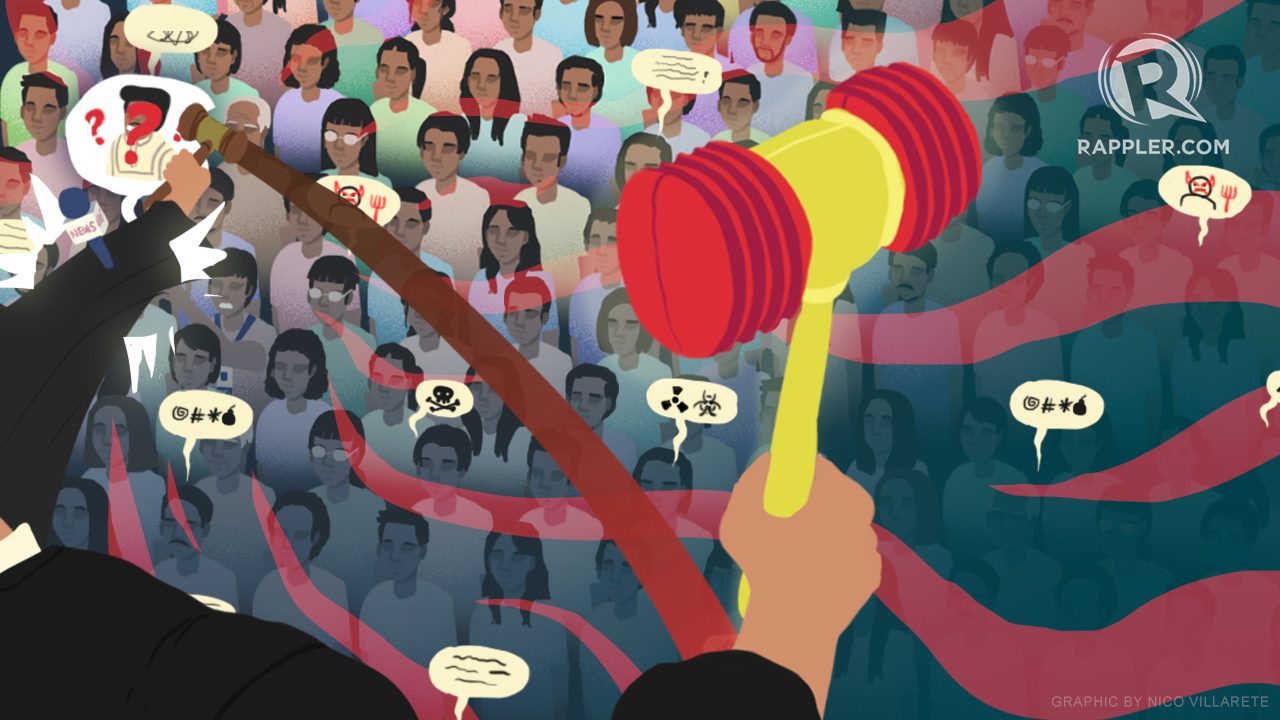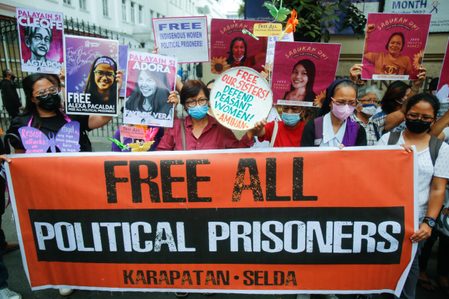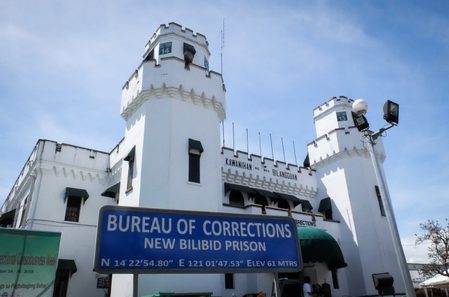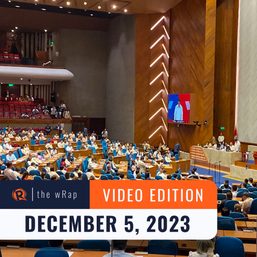SUMMARY
This is AI generated summarization, which may have errors. For context, always refer to the full article.

MANILA, Philippines – The Philippine government held a two-day national jail congestion summit to address the sorry state of the country’s jails and prisons.
During the summit held by three branches of the government – executive, legislative, and judiciary – several recommendations to ease the congested prisons were mentioned. Among the suggestions was to decriminalize certain offenses like libel.
The announcement was made by no other than House Speaker Martin Romualdez, who heads the lower chamber of Congress.
Human rights approach?
In his speech during the summit’s opening on December 6, Romualdez said that congestion of jails is not “merely a logistical or infrastructural problem,” but rather “a profound human rights issue.” He added that the overcrowded conditions of jails and prisons reflect on the country’s judicial processes, and on “the very essence of justice and humanity in our society.”
“As we move forward, it is crucial to recognize the dire situation of persons deprived of liberty (PDLs). Many languish in overcrowded jails, not due to the severity of their crimes, but because of prolonged processes and inadequate infrastructure. This reality calls for our immediate and decisive action,” the House Speaker said.
According to government data, facilities under the Bureau of Jail Management and Penology (BJMP) suffer from a congestion rate of 238%, as of November 2023. Meanwhile, facilities under the Bureau of Corrections (BuCor) suffer from a 323% congestion rate. The BJMP houses PDLs awaiting conviction and those convicted with a penalty of three years and below, while the BuCor has custody of convicted PDLs with a sentence of over three years.
Due to this state of jail and prison facilities, Romualdez said the House is “ready to consider” and “will seriously study” certain proposals, which include the review of crime classification. The Speaker said Congress is open to a review of the classification of capital and non-bailable crimes, adding that the Revised Penal Code (RPC), which contains criminal offenses should be overhauled.
“This review will assess the deterrent effect of these classifications and consider the decriminalization of certain offenses like libel, abortion, and dueling. Our goal is to ensure that punishments are proportionate to the gravity of the crimes committed,” Romualdez said.
Department of Justice (DOJ) spokesperson Assistant Secretary Mico Clavano said they leave the matter to decriminalize libel to the legislative department since the DOJ’s mandate is to implement law. Clavano explained that processing, prosecuting, and convicting criminals are part of the DOJ’s mandate.
“So sa amin po ang gusto lang namin gawin ay ibigay sa kanila ‘yong mga datos, ‘yong statistics sa part ho namin sa DOJ. Sila na po bahala mag-discuss at siguro mag-analyze do’n sa legality or decriminalization ng abortion at libel,” the DOJ spokesperson added.
(So for us, what we want to do is to give them the data, the statistics on our part in DOJ. It’s up to them to discuss and analyze the legality or decriminalization of abortion and libel.)
Libel in the Philippines
Before Romualdez, some lawmakers already made some moves to decriminalize libel, like Senator Risa Hontiveros, who sought to decriminalize the offense by filing a bill in December 2022. The filing coincided with the conviction of Baguio City journalist and Rappler contributor Frank Cimatu. Even private citizens like former vice presidential candidate Walden Bello recently challenged the crime.
In the Philippines, there are two types of libel: one under the RPC, and the other under the Cybercrime Prevention Act of 2012.
Article 353 of the RPC punishes a person found guilty of libel to six years in prison and a fine of up to P6,000. Under the cybercrime act’s implementing rules and regulations, a person found guilty of cyber libel will face jail time of six years or more, or pay fine of P6,000 up to the maximum amount stated by the court, or both.
When the question about the legality of cybercrime reached the Supreme Court, Senior Associate Justice Marvic Leonen voted to declare cyber libel unconstitutional. The senior magistrate explained that the 1930s’ definition of the law was outdated and no longer applied to the age of the internet.
The cyber libel case of Nobel Peace Prize laureate and Rappler CEO Maria Ressa became an important case in the context of cyber crime in the Philippines. Due to Ressa’s cyber libel conviction, the prescription period of libel – or the period when you can still be sued for a libel or cyber libel offense — was reset.
The article in question was published months before the enactment of the cybercrime law, but a correction of a typographical error was made in 2014.
Manila Regional Trial Court Branch 46 said the correction of an error could be considered republication. The Court of Appeals, did not affirm the conviction, but also extended the prescription period from 12 years to 15 years.
Other approaches to congestion
For Clavano, the decriminalization of certain crimes like libel “is only one of the short term solutions” to decongest prisons. The DOJ spokesperson said there are other ways to ease decongestion like decreasing the number of people being incarcerated, reducing the amount of bail, and setting a higher threshold of evidence required in prosecuting an alleged crime.
During his speech, Romualdez also listed down a few approaches in decongesting jails:
- Reducing unnecessary admissions to jails by providing alternatives to jailing for minor and first-time offenses committed by adults
- Creation of the Department of Corrections and Penology, which will streamline the operations of prisons taken care of by a single dedicated agency
- Focus on reintegration of offenders and psychosocial rehabilitation
- Making recognizance law more accessible. Aside from bail, recognizance allows accused to gain temporary freedom without having to pay, but will only be subjected to certain conditions.
- Strengthening the Commission on Human Rights to prevent unjust jailing or detention
For many years, the problem on jail congestion has hounded the country – and unfortunately it has yet to be solved.
Southern Illinois University Carbondale criminology professor Raymund Narag, a former PDL himself, said the problems in our jails were caused by lack of proper resources, the poor economic condition of PDLs, and the existing prison culture anchored on regionalism, among others.
Narag said reforming prisons would require approaches on structural, organizational, and cultural levels. Structural means improving the structure of prisons by making them manageable by creating regional facilities or creating a mega prison that can house PDLs properly.
Organizational means improving the entities handling the facilities, while cultural means reforming the mindset and the way of living of PDLs inside prisons. – Rappler.com
Add a comment
How does this make you feel?













![[ANALYSIS] Decriminalizing libel](https://www.rappler.com/tachyon/2024/01/TL-libel-jan-4-2024.jpg?resize=257%2C257&crop=273px%2C0px%2C720px%2C720px)

There are no comments yet. Add your comment to start the conversation.